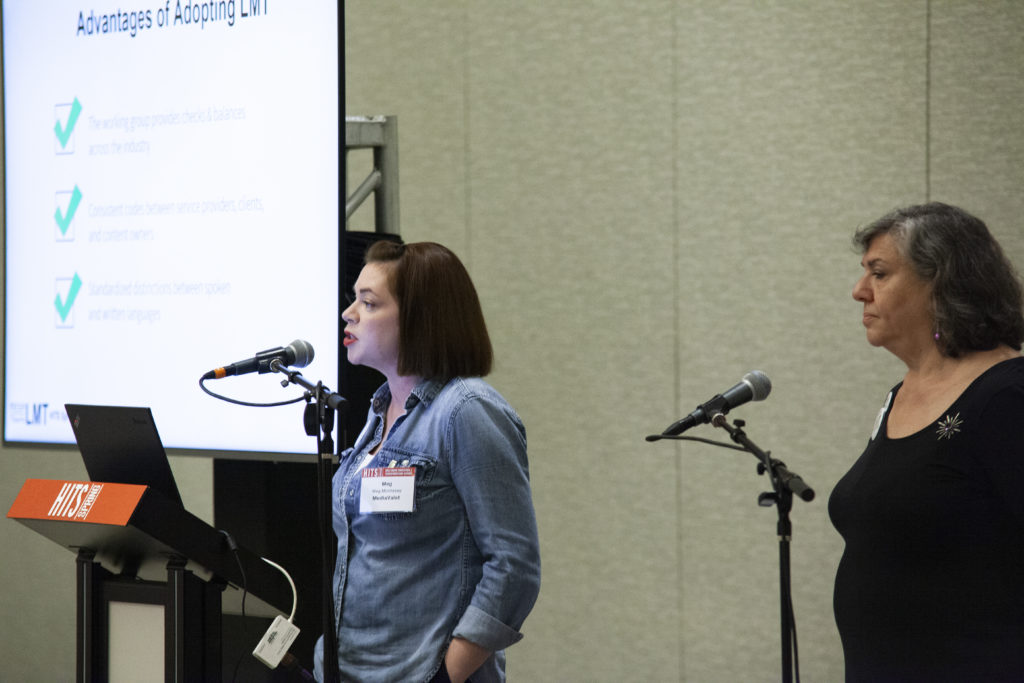M+E Connections

HITS Spring: LMT Metadata Table Continues to Make Strides
Story Highlights
MESA’s Language LMT Metadata Table (LMT) Working Group is moving fast, with more languages being added to serve the media and entertainment (M&E) sector and beyond all the time, along with hybrid languages and streamlined descriptions, according to the group.
During the Standards + Automation breakout session “LMT – Let’s Move Together!” May 19 at the Hollywood Innovation and Transformation Summit (HITS), the group’s co-chairs provided a glimpse into the future with the SMPTE register and validator.
LMT is also kicking off a new website that they demonstrated during the session.
“There [was] no consistent, centralised, language table of codes that covered the broader geographic areas like Latin America and “all of the flavours of English,” according to Meg Morrissey, LMT co-chair.
So LMT was created to solve that challenge, she noted, noting it is a “set of language codes that have been vetted by members of the industry.”
“We have also vetted them by native language speakers and experts in language history and linguistics,” she pointed out. “By using LMT codes specifically, you know that the application of this standard is accurate and has been vetted by experts.”
“It makes interoperability go even better because of the consistency” as well, Yonah Levenson, LMT founder and co-chair, chimed in.
 And “interoperability is the key right now, particularly with the way that digital supply chains are changing and the way the creatives are changing as well,” Morrissey said..
And “interoperability is the key right now, particularly with the way that digital supply chains are changing and the way the creatives are changing as well,” Morrissey said..
“So why did we need the LMT?” Morrissey asked rhetorically. “LMT metadata is used by every aspect of media and entertainment but it’s rarely standardised between systems or across supply chains,” she replied to her own question.”
She noted that she had seen that first-hand, pointing out that if you have a group of people in a room who are from various different systems at one company and ask what their language code is for something, “you get a different answer from every person.”
So there was a need for a “flexible, granular and modular language standard that can be applied in both broad and narrow contexts,” she said. “People are confused and overwhelmed by all of the options available,” she noted. No surprise there. After all, “there are over 6,000 languages in the world,” she said.
Other advantages of LMT include the fact that “we provide checks and balances from across the industry,” said Morrissey.
From 2017 through LMT’s inception in 2020, “we curated 187 languages [and] just last year we added another 100,” she pointed out. So far this year, “we’ve added another 18 and we’ve got a few more on slate that are being researched as we speak,” she added.
To view the entire presentation, click here.
The Hollywood Innovation and Transformation Summit event was produced by MESA in association with the Hollywood IT Society (HITS), Media & Entertainment Data Center Alliance (MEDCA), presented by ICVR and sponsored by Genpact, MicroStrategy, Whip Media, Convergent Risks, Perforce, Richey May Technology Solutions, Signiant, Softtek, Bluescape, Databricks, KeyCode Media, Metal Toad, Shift, Zendesk, EIDR, Fortinet, Arch Platform Technologies and Amazon Studios.









